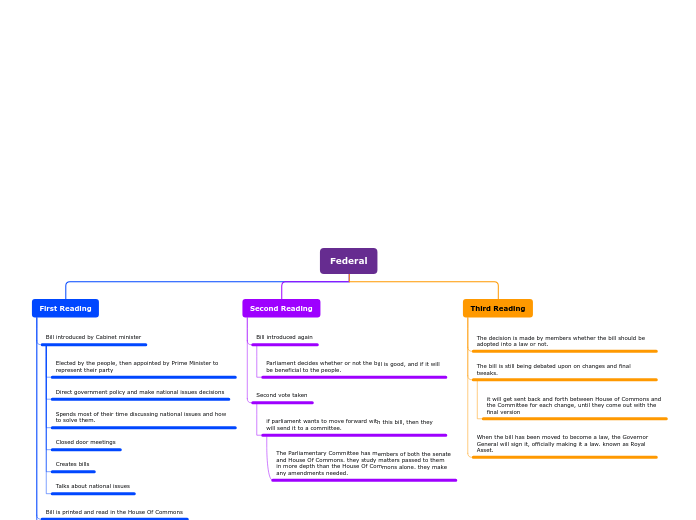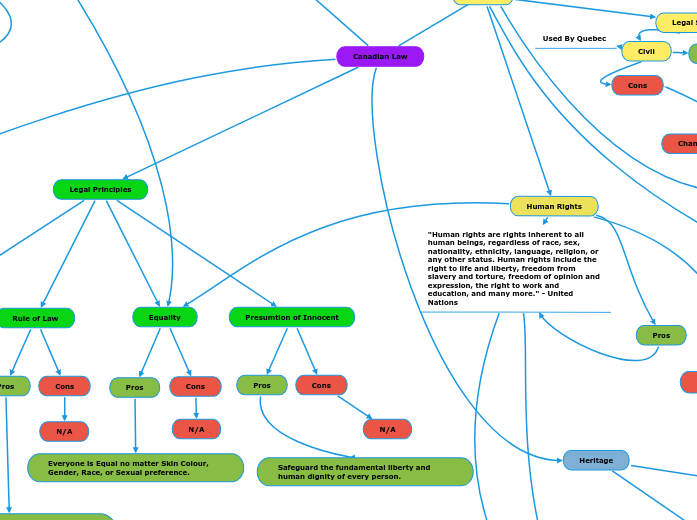Provincil
Bill gets voted on ts entirety. the decision is made to make this bill a law and give it Royal Asset.
If the house decides to move forward with the bill. it gets reprinted and posted to the internet as an official provincial law.
Final stage of the bill passing
Report To The House
the chair if the committee sends the bill to the house. where it then gets reprinted showing the changes, and posted to the internet.
the bill, once moved on, gets an order to be read in the Third Reading.
Committee Stage
Call witnesses, make changes to the bill, and look at it more in depth (clause by clause). any changes get votes on. when the changes are done, the bill gets voted on as a whole, on whether or not the committee wants to send it to the House or not.
This s where the debating of the bills principle happens.
The debate takes place in the Orders Of The Day. Monday - Thursay. Private members bill gets debated at a different time. Only on Thursday afternnoons whats called the Prime Ministers Public Business.
No voting happens, just introdution to the bill.
Bills get introduced to the house Monday to Thursday on what's known as the Routine Proceeding introduction of bills.
Municipal
Procedure Eight
The third reading is dissusussed and a vote is taken. If the vote is carried the bylaw is considerd passed and is signed soon after.
Procedure Seven
The council may expedite the bylaw by having three readings in one meeting. This must be agreed apon by all members at the meeting.
Procedure Six
There is a third reading of the bylaw. This will give the council an opertunity to recive public imput.
Procedure Five
If there are amendments to the bylaw members of the council must provide a chance to review the amended bylaw before the third reading.
Amendment definition: a minor change or addititon to a piece of legislation.
Procedure Four
There is a second reading and another vote is taken.
Procedure Three
The first reading of the bylaw is discussed and a vote is taken. The bylaw is not necessarily read out loud at the meeting due to the council members being provided the chance to read the proposed bylaw prior to the meeting.
Procedure Two
Propose the bylaw to the public.
- legislation requires public notice.
- local policies require public notice.
Procedure One
Town council members review a bylaw and create a draft before there is a first reading.
Bylaw definition: a law created by an organization to regulate something.
Federal
Third Reading
When the bill has been moved to become a law, the Governor General will sign it, officially making it a law. known as Royal Asset.
The bill is still being debated upon on changes and final tweaks.
it will get sent back and forth between House of Commons and the Committee for each change, until they come out with the final version
The decision is made by members whether the bill should be adopted into a law or not.
Second Reading
Second vote taken
if parliament wants to move forward with this bill, then they will send it to a committee.
The Parliamentary Committee has members of both the senate and House Of Commons. they study matters passed to them in more depth than the House Of Commons alone. they make any amendments needed.
Bill introduced again
Parliament decides whether or not the bill is good, and if it will be beneficial to the people.
First Reading
First Vote Taken
Takes place in House Of Commons
Located in Ottawa
One of two parts of parliament
Centre of political power
Bill is printed and read in the House Of Commons
Bill introduced by Cabinet minister
Talks about national issues
Creates bills
Closed door meetings
Spends most of their time discussing national issues and how to solve them.
Direct government policy and make national issues decisions
Elected by the people, then appointed by Prime Minister to represent their party









